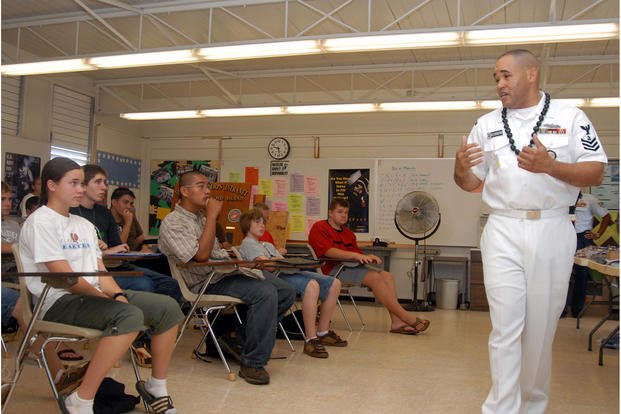Thinking about joining the military?
Well, you probably have hundreds of questions, but once you walk into the recruiter's office, you can't remember any of them. With so many benefits to joining the military and so much information available, it is impossible for your recruiter to cover everything.
Here are five important questions and items to discuss with your recruiter.
1. When Do I Take the Armed Services Vocational Aptitude Battery (ASVAB)?
While what you do in the military is dependent on this test, not everyone is ready to take the ASVAB test right away. Being prepared and scoring as high as possible will give you the most options when you start your military career. To prepare for the ASVAB, you can buy a study guide or visit Military.com's online ASVAB preparation and practice tests. Most recruiters will give you a practice test to predict your actual score on the ASVAB, and a low score might mean you need to do more prep work for the real thing.
2. How Soon Will I Leave for Basic Training?
Joining the military and leaving for basic training are two different things. When you join the military, you are qualifying first by testing and second by taking a physical. After qualifying in both areas, you will pick your job and swear-in. You're not leaving for basic training at this time. It is important that your recruiter and the Military Entrance Processing Station (MEPS) liaisons know when you are available to leave for basic training. It is always better to get your career started as soon as possible, but not everyone can do this. For instance, college students probably won't be available until after the semester, and high school seniors must know their graduation date to find out when they can leave. Whatever the reason, discuss it with your recruiter.
3. When Will I Get My Job Assigned?
Each branch of the service has its own method of assigning jobs. For example, the Navy will give you a job while you are at MEPS. But while the Air Force can give you a job at MEPS, they usually put you on a qualified and waiting list for preferred vocations. Understand what job you have been assigned and when that group is leaving for basic training.
4. What Documents Do I Need to Start the Recruiting Process?
Your recruiter will give you a list of documents needed for processing by the military. That list may include a government-issued ID such as a driver's license, Social Security card, high school diploma, birth certificate, college transcripts, marriage license, medical documents, court documents, adoption documents, etc. If unable to locate the documents, you may need extra time to order the necessary replacements. An early start will make the process of joining much smoother.
5. Do You Need My Complete Medical and Legal History?
Recruiters need to know your complete medical history and information about all legal infractions, including traffic tickets, misdemeanors, felonies, etc. The recruiting commander may grant a waiver or overturn many legal issues that are disqualifying initially. If your recruiter does not have this information, he or she can't help you with the process.
Disclosing your medical history and getting supporting documentation for medical issues will give you the best possible chance of qualifying for the military. Law violations work pretty much the same way. Disclosing them upfront will give the recruiter the best opportunity to run a waiver, if applicable.
Remember, there are many questions you need to ask your recruiter and many things you will need to tell them. Write down your questions. I had a recruit come into my office with a list of about 75 questions. After we spent about an hour going over her list, she felt much better about the process because she was informed. This is a job interview, so make sure you are involved and informed.
Interested in Joining the Military?
We can put you in touch with recruiters from the different military branches. Learn about the benefits of serving your country, paying for school, military career paths, and more: sign up now and hear from a recruiter near you.














